Jean-Jacques Lavigne
| Arms | |||||||||||||||
|---|---|---|---|---|---|---|---|---|---|---|---|---|---|---|---|
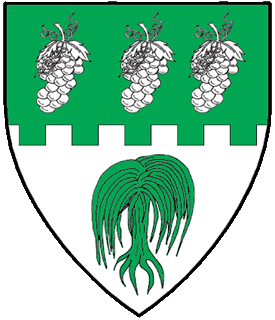 Per fess embattled vert and argent, three bunches of grapes and a willow tree eradicated counterchanged. Date added to Roll: August, 2002 | |||||||||||||||
| Jean-Jacques Lavigne in the An Tir Roll of Arms. | |||||||||||||||
| |||||||||||||||
| Badges | |||||||||||||||
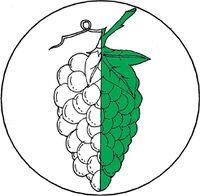 (Fieldless) A bunch of grapes per pale argent and vert. Date added to Roll: TBD |
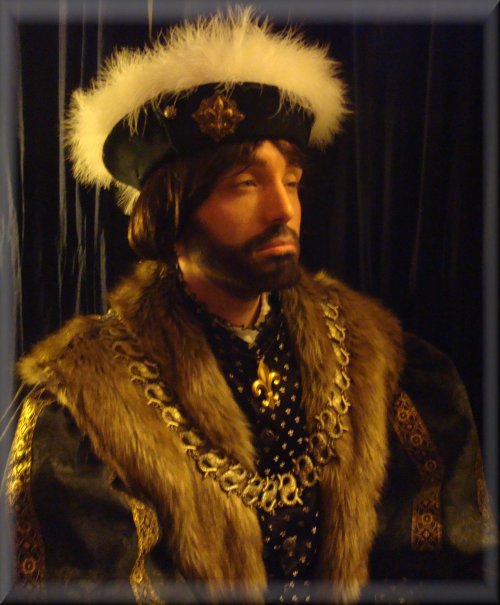
SCA History
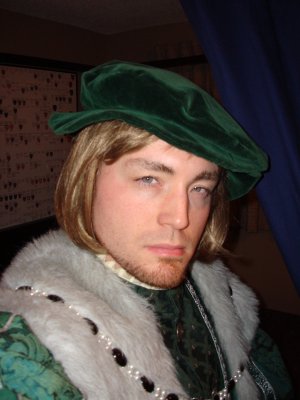
Jean-Jacques was always fascinated with medieval, and particularly renaissance, history beginning in childhood. He first learned of the SCA from Rafe Neuton; His first event was a brief day trip to the Long and Short of It Tournament and first camping event was An Tir-West War 2001. After his first society camping experience he was very active in the society from 2001 through 2011 before everyday life kept him busy elsewhere although he periodically attended a few events from 2013-2017. From late 2017 into early 2022 his life was focused on family hardships. In the spring of 2022 he returned to more active participation.
Jean-Jacques was twice a Protege to two different mistresses of the Pelican - first Mistress Astrid of Flanders for a period of time before he asked to be released so he could be the protege of Viscountess Nadezhda Volynskaiia after having served as her personal herald when she reigned as Princess of the Summits. A couple years after the oath was made, in July 2009 Nadezhda released Jean-Jacques and the rest of her proteges needing to clear her commitments.
Jean-Jacques had also tried twice to serve as a Courtier of the Baroness of Terra Pomaria first under the reign of Baroness Elspeth of Wyre Forest and secondly under Baroness Marianna ferch Orla. Why he did not complete the trials under Elspeth has slipped Jean-Jacques memories, but he was unable to complete the trials under Marianna due to a winter storm that made travel to the trials not doable.
After stepping down as baronial herald in 2005, he remained in the lesser office of Grete Boke until 2011, however, his increasing demands in mundane life resulted in participation at event and local gatherings to wax and wane from later 2006 through 2010. By 2011, participation in the society was nearly null and later that year the office of Grete Boke was resigned. An intermittent and brief attempt to return occurred in 2013 and more in 2014, but was short with virtually no activity in the society from 2015-2021 save a partial attendance of Bar Gemels in 2017. In the spring of 2022 Jean-Jacques returned to Bar Gemels day tripping where he received a very warm welcome from old friends and new alike. He returned again at Long and Short of It 2022 where again he received the same kind greeting, and from there he has began an effort to return more regularly to the society including stepping back up at Grete Boke at Terra Pomaria Business Meeting August 15th.
Offices
- Aug 2022 to current - Minister of the Grete Boke for the Barony of Terra Pomaria
- Apr 2008 to Jun 2008 - Interim Hazel Leaf Pursuivant / Herald of the Barony of Terra Pomaria
- Oct 2007 to May 2008 - Minister of the Lists for the Barony of Terra Pomaria
- Aug 2002 to Apr 2005 - Hazel Leaf Pursuivant / Herald of the Barony of Terra Pomaria
- Apr 2002 to Oct 2011 - Minister of the Grete Boke forthe Barony of Terra Pomaria
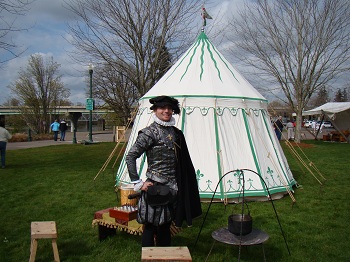
In Persona
The protagonist of the name "Jean-Jacques" or "Jean-Jacques Lavigne" was born and baptized a Roman Catholic at Saint Nicolas-de-Valenciennes parish on circa 1496 to Robert Poutré, Lord Lavigne and Eva (Günther), the latter a widow of Guillaume Jacques who conceived and bore Jehan out of wedlock after the passing of her husband. Jean-Jacques was later legitimized by his father, so that he kept his surname at birth as well as adopting his father's surname Lavigne. Jean-Jacques also has one full younger sister, also illegitimate, Madeleine-Anne Lavigne, later also legitimized, born circa 1500.
Jean and Anne were raised by their courtesan mother in the slums of Valenciennes - their mother coming from a successful tailoring family originally from Mittelbrun, Rhine-Pfalz. Eva's father Anton was an only son who inherited his father's business dealings, but having a fondness for liquor, wasted away the family fortune. His wife, Mary, was the daughter of an English wheeler - Richard Abbott, and wife Agnes (nee Pearce), who Anton had met while merchanting in England. Eva grew up struggling so that she learned her way to survive as she could. After two childless failed marriages leaving her a widwo, the first to a soldier who never returned from war and the latter to a merchant who set out to peddle his wares and died in a shipwreck, Eva being of great beauty, caught the eye of Robert, Lord Lavigne. However, given Lord Lavigne's status in society he could not marry below his position so that he vowed to never taken a lady of equal rank's hand in marriage out of his never-dying love for Eva.
Jean-Jacques, thanks to dealings of his father, was provided a thorough monastic education at an early age where he learned to read and write and the art of diplomacy. From his education, Jean gained access working in the courts of England, France and the Holy Roman Empire as a cleric and herald, and was legitimized as Robert Poutré's son and legal heir. In his mid-life years he assisted his father in the running of his estate lands.
Jean-Jacques sister had several illegitimate sons, so it is believed there were two additional individuals of the same family named Jean-Jacques that lived through the late 15th, entire 16th and very early 17th Centuries. Through surviving documentation its difficult to ascertain relationships between the two, however, it is believed there were an uncle and nephew: one born circa 1496 to circa 1550 and the other born circa 1526 to circa 1610. Both were members of the gentry class family of Poutré that resided in and around Valenciennes in the County of Hainaut in Habsburg Southern Netherlands. All known members of this family named Jean-Jacques were politically-driven being the model of a Northern European Renaissance man practicing renaissance dance, passtimes, partaking in music playing of the time as they engaged in the courts of England, France and the Holy Roman Empire. Simply they were courtiers, diplomats and officers of the greatest courts in Europe at the time.
Interests

- Genetic genealogy
- Advanced level genealogy - including medieval through 17th Century genealogy
- Ambience encampment / event appearance. Authenticity in presentation -or- ambience / modern practical, period appearing
- 16th-17th Century everyday middle class lifestyle
- Pre-18th Century gay history in England / Europe
- 16th-17th Century Games and Pass times
- 16th-17th Century Encampments
- 16th-17th Century Farming / Gardening
- 16th-17th Century Dancing
- 16th-17th Century Costuming, both Henrican Tudor and Elizabethan
- 16th-17th Century, specifically England emphasis on the Tudor and Stuart Dynastic Periods and Germany and France of the same era